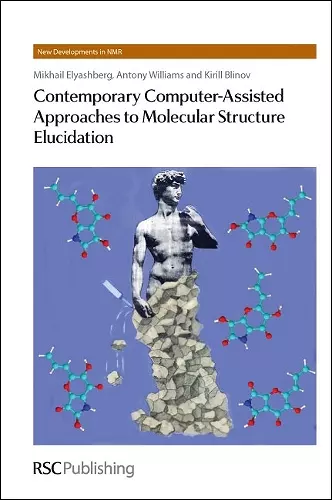Contemporary Computer-Assisted Approaches to Molecular Structure Elucidation
Antony Williams author Mikhail E Elyashberg author Kirill Blinov author
Format:Hardback
Publisher:Royal Society of Chemistry
Published:30th Nov '11
Currently unavailable, our supplier has not provided us a restock date

Computer-Assisted Structure Elucidation (CASE) systems are a combination of software algorithms and tools to support and enable chemists and spectroscopists engaged in the process of molecular structure elucidation via the analysis of spectroscopic data. These expert systems dramatically reduce the time associated with structure elucidation and improve the reliability of the results. Contemporary Computer-Assisted Approaches to Molecular Structure Elucidation describes the principles on which these expert systems for spectroscopic structure elucidation are based and concisely explains the algorithmic concepts behind the programs. The authors use their own personal experiences in the development of the Structure Elucidator (StrucEluc) CASE software system to discuss the present state-of-the-art in computer-assisted structure elucidation. Scientists that are presently using CASE systems will be interested in the algorithms and modern approaches and for organizations that are currently using the StrucEluc platform the book is designed to help researchers understand the strategies behind CASE as well as details regarding the StrucEluc platform. For scientists that have never used CASE systems they will now have access to all necessary information to understand CASE systems for mastering this new and very effective approach to structure elucidation. The authors overall goal is writing this book is to produce the 'must read' definitive text that will represent the results of decades of work to develop computer-assisted structure elucidation software systems. CASE systems are now powerful software tools commonly outperforming and correcting human interpretations of data. This book will also provide an historical perspective of the work of the founding fathers of the technique and identify the challenges that have been overcome to produce modern CASE systems.
"Computer-assisted structure elucidation (CASE) aims to provide users in chemistry, molecular biology, or other areas dealing with structures of small molecules with suggestions on the structural identity of molecules based on spectroscopic, chromatographic and other boundary information. With "Contemporary computer-assisted approaches to molecular structure elucidation", Mikhail Elyashberg, Anthony Williams and Kirill Blinov, all world-renowned experts on the topic, have recently written a normative standard text-book on the topic. Published by RSC publishing in 2012 and on 481 pages, the book provides a comprehensive overview on computer-assisted structure elucidation. The book is divided into three parts (Basics of CASE, Overview of CASE systems, and a comprehensive discussion of their own system, Structure Elucidator) comprised of overall 14 chapters. As the authors point out, the CASE process can be reduced to logically interfering `the most probable structural hypothesis from a set of statements reflecting the interrelation between a spectrum and structure'. Given that every human expert in structure elucidation will be biased by his or her own education, history of certain compound classes worked on, or types of spectroscopy used, CASE systems can be incredibly valuable by suggesting solutions to the structure elucidation problem outside of our range of experience. The book delivers what the title promises. I have been working on CASE systems in the last 15 years and wrote a number of reviews on the topic. This is clearly the most comprehensive book on the topic on the market and generally a valuable resource for anyone working in the area of structure elucidation of small molecules." -- C. Steinbeck * Amazon review *
ISBN: 9781849734325
Dimensions: unknown
Weight: 872g
482 pages